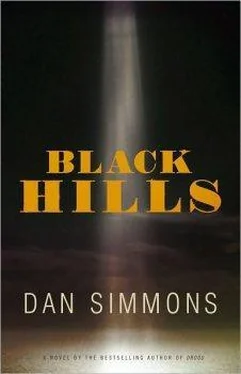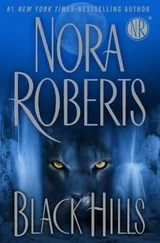— Yes. The cancer has its grip on me today.
“Would you… do this thing… just because of the cancer? I mean, if you hadn’t failed at Mount Rushmore?”
Paha Sapa does not answer because he cannot. But he hopes he would not be here with the Colt just because of the pain and disease. It bothers him a little that he’ll never know.
Almost out of sight of the parking lot, he finds a smooth place to sit. The grasses here come up almost to his shoulder when he’s sitting in them. The clouds are breaking up some now, allowing patches of sunlight to move across the rolling hills and curving valley below, and everywhere the grasses are moving in languid thrall to the wind.
“Benteen and Reno had a better hill,” says the ghost, his tone calmly, coolly professional rather than wistful or envious. “I could have held out here all day and night with my men… if I’d had this hilltop.”
— Does it matter?
There comes the faintest echo of sad laughter. It’s as if the ghost is already leaving him. But not quite yet.
“Paha Sapa, did you see those ravens? They followed us down the road. All the way in.”
Paha Sapa saw them and sees them now, perching on a rail twenty yards away on a splintered old fence that runs from the parking lot, perhaps delineating the end of the park boundary. The two ravens are watching him. Watching them .
He doesn’t like this. Who would? Ravens are symbols of death for the Lakota, but then most things are in one story or another. Some say that it’s the ravens that carry the wanagi of dead people up to the Milky Way to begin the spirit-journey there. Others, including Limps-a-Lot, did not believe this.
He tries to remember the Lakota word for raven. Was it kagi taka or kan˙gi? He can’t recall. He’s losing his own language.
It doesn’t matter now.
Paha Sapa sits cross-legged in the grass and takes out the heavy revolver. It smells of gun oil and warm metal. He’s left one chamber empty under the hammer so he doesn’t accidentally blow his foot off—advice from a Seventh Cavalry Crow scout who’s been dead for more than fifty-five years—but a loaded chamber revolves into place as he thumbs the hammer back.
He has decided that he’s not going to draw this out. No Death Song nonsense. No ceremony. He’s decided on the right temple and sets the muzzle there now.
“Wait. You promised me… about the cremation.”
Paha Sapa lowers the pistol only slightly.
— I wrote it out. On a napkin. In the bathroom at the diner.
“I don’t believe you.”
— Where were you? Dozing?
“I don’t pay attention to everything you do, you know. Especially at times like that. Where is it? Is it somewhere people will find it?”
— It’s in my shirt pocket. Will you please shut up a minute? Just one minute.
“Show me the note.”
Paha Sapa sighs—truly irritated—and carefully lowers the hammer. He removes the napkin from his shirt pocket and holds it in front of his own eyes, thinking that Custer is being a shit to the last second of his unfairly extended existence. The note in pencil begins “My Wishes” and is only one sentence long.
— Satisfied?
“You misspelled remains —it’s not manes . There’s an I .”
— Do you want me to go back to town to the diner and get the pencil I borrowed from the waitress?
“No.”
— Good-bye, Long Hair.
“Good-bye, Paha Sapa.”
Paha Sapa lifts the revolver, cocks the hammer back, and sets his finger on the trigger. The sun is warm on his face. He takes a deep, sad breath.
— Mr. Slow Horse!
It’s not the ghost; it’s a woman’s voice. Paha Sapa is so startled that he almost pulls the trigger by accident. Lowering the cocked hammer and then the pistol and looking over his shoulder, he sees two women moving in his direction through the tall grass.
His body was turned away from them such that it’s probable that they did not see the pistol. He hurriedly slips the Colt into the canvas bag and awkwardly gets to his feet. Everything in him cries out in the pain of rising.
— Mr. Slow Horse! It is you, is it not? The motorcycle was Robert’s, I know. I’ve seen the photograph a thousand times. He gave it to me. I saw the photograph of you but did not get to keep it.
The women are dressed in expensive and stylish dresses and wide-brimmed hats. The older of the two looks to be in her late thirties and her accent seems to be French. The younger woman, who bears some resemblance to the first, can’t be older than seventeen or eighteen. Her eyes are a brilliant hazel.
Paha Sapa is very confused. He looks back toward the road and sees a long, sleek 1928 Pierce-Arrow sedan stopped there. The sun has come out from beneath the fast-moving clouds and turns the expensive white automobile into something too dazzingly beautiful for this world. There’s a mustached man standing by the car and Paha Sapa realizes stupidly that the man is a chauffeur.
The older woman is still speaking.
—… so we did not arrive at the Mount Rushmore until yesterday, and Mr. Borglum was very gracious, very sorry that we had missed you. All of our letters and telegrams had gone astray, you see, since we had been trying to reach you via the name William Slow Horse de Plachette, the name and the Keystone address Robert gave us in his delirium—and the returned letters said “undeliverable”—and we also wrote the mission on the Pine Ridge Reservation. But Mr. Borglum said you would be here at the Custer Battlefield, so I told Roger to drive like the very wind, and here we are and… oh!… you are Mr. William Slow Horse, are you not? Paha Sapa to your friends and family?
He can only gape stupidly. The Colt in its canvas shroud lies heavy at his feet. Finally he can make noises that simulate speech.
— Borglum? Borglum didn’t know where I was going. Borglum could not have told you…. No one knew where I was…
He stops, beginning to understand what the woman has said.
Her voice, with the accent, is almost musical.
— Oh, yes. He was quite certain about where you were headed… is “headed” the right word? He even told us that you would be at this second hill, not the first, where the big monument is.
Paha Sapa licks his lips. He cannot tear his gaze from the two women’s faces. On the fence far behind him, one of the ravens makes an accusatory noise.
— I’m sorry, miss. I’m… confused. What did you say your name is? You say you knew my son?
The woman blushes and for a second looks angry at herself, or perhaps as if she wants to cry.
— I am so sorry. Of course. You never received my letters… we know that now. Nor the telegrams the past months.
She holds out her hand. She is not wearing gloves.
— I am Madame Renée Zigmond Adler de Plachette. Your… what is the phrase in English? Yes. Daughter-in-law. I married Robert in November of nineteen eighteen… November fourteenth, to be precise. My father, Monsieur Vanden Daelen Adler of Belgium, was, of course, concerned about the marriage because Robert was…
She pauses. Paha Sapa prompts.
— An Indian?
Madame Renée Zigmond Adler de Plachette laughs softly.
— No, of course that was no problem. No problem whatsoever. It was that he was a… the word in English escapes me… a gentile. Yes, gentile. We are Jewish, you see, from one of the oldest diamond-cutting families of Jews in all of Belgium. But in the last few years… Well, you understand the situation growing in Germany and Europe, Herr Hitler and all… so Father is moving his business and our family to Denver and New York. To Denver, you see, because Flora’s fiancée, Maurice, has always wanted to start a—how do you say it?—a beef cows ranch, and of course to New York because of Father’s diamond business, since he was, it is not immodesty to say, the preeminent diamond cutter and then diamond merchant in Belgium and he hopes to build the same reputation here in America. Flora and I have come ahead in order to… Oh, my! Oh, dear!
Читать дальше












